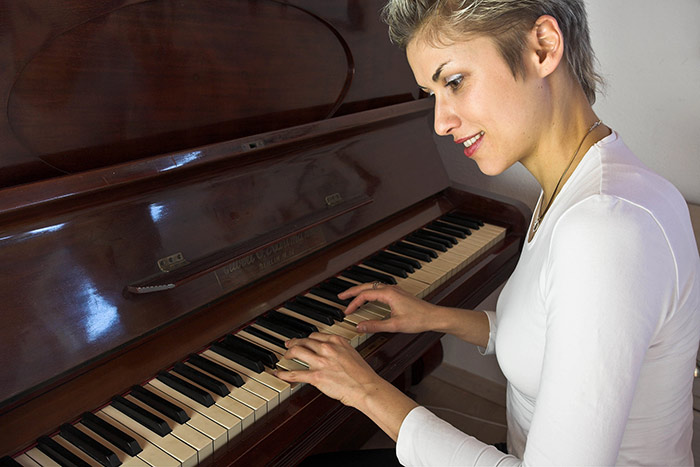Each of us looks at the piano as a complex and difficult instrument, but it is not necessary to learn to play the piano to be a professional. The piano combines simplicity and professionalism, so young children, as well as the elderly, can learn to play very simple and calm pieces on the piano. This will, of course, bring them many health, psychological, physical, and mental benefits. Let’s learn about some of these benefits.
Psychological Benefits:
Reason #1:
Playing the piano helps significantly relieve anxiety, stress, frustration, and all the negative feelings that we experience daily. This is also suitable for the elderly, as playing the piano brings them out of a state of depression and clears their minds, allowing them to face and solve all daily problems and intractable thoughts.
Reason #2:
Playing the piano also teaches you how to discipline yourself and control your emotions, especially when you play classical pieces of music, as they depend on the fluctuation of emotions from time to time. Reading the musical notes and performing the entire piece increases your ability to be patient and also increases your self-confidence. Therefore, playing the piano is one of the most important and quickest ways to increase self-confidence and self-esteem.
Physical Benefits:
Reason #3:
Strengthening the muscles of the hands and keeping the back upright: Playing the piano helps strengthen the powers of the hands and coordinate the movements between the fingers. Playing the piano also has basic rules, the first of which is keeping the back tight and straight, which helps you improve your sitting position.
Mental Benefits:
Reason #4:
Playing the piano with both hands activates areas and cerebral centres throughout the brain, which makes the two hemispheres of the brain work together. Therefore, it activates the auditory region and the brain’s frontal lobe, which is responsible for pictorial intelligence and concentration. Just as using the legs to control the sound coming from When pressing the piano pedals, the piano makes the entire body move, developing the player’s intelligence, concentration, and ability to control his whole body while playing the piano.
Reason #5:
Also, reading sheet music while playing the piano simultaneously develops visual and auditory skills.
Reason #6:
Improve language skills.
According to the results of a study conducted by neuroscientists at the University of Southern California over five years, it turns out that teaching music helps accelerate the growth of the auditory pathway in the brain, which is responsible for processing sound, developing language, reading skills, and speech perception, as neuroplasticity increases, which is a physiological change that occurs in The brain in response to the environment, in this case occurring in response to exposure to music. Music stimulates the auditory system, which is crucial in developing language, reading and communication skills.
Reason #7:
Improve memory capabilities.
Learning music requires remembering a huge amount of information related to the notes, their arrangement, time rhythm, etc., which requires increasing memory capacity and energy. That is, the child’s memory grows in some way to absorb what he learns in music, but this expands to include the rest of the input he is exposed to, such as school texts, lectures, etc., which explains the improvement in the ability of children who study music to learn new languages and mathematics.
Reason #8:
Help to understand mathematics better.
There are many similarities between mathematics and music, and by understanding musical concepts such as rhythm and scale, a child can also understand concepts such as division, fractions, and patterns.
More Creativity
Listening to music, especially classical music, increases creative thinking, a technique that simultaneously requires both hemispheres of the brain, which is also described as creativity, according to a 2016 report funded by the Netherlands Organization for Scientific Research.
Listening to music may help enhance creative thinking in inexpensive and effective ways. Sometimes, no matter how much we try to talk and use words to express our feelings, these words still fall short of expression, so the piano performs this function to the fullest extent, helping you create your own pieces. This is called musical composition, which makes you touch the hearts and feelings of others and increases love in human relationships.
Conclusion
“I think music is therapy in itself. It is an explosive expression of humanity. It’s something we’re all affected by. “No matter what culture we belong to, everyone loves music.” -Billy Joel
“Sometimes words need music, but music doesn’t need anything” -Edward Grieg
“Music is medicine for the mind” -John Logan
“Music is the art of great people” -Longfellow
“Music gives soul to the universe, wings to the mind, flight to the imagination and life to everything” -Plato










